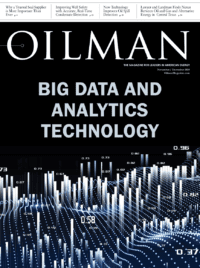Kamilia Putri is a production engineer at Schlumberger and is currently based in Houston, Texas. As an active Society of Petroleum Engineers (SPE) member, she was the communication coordinator with SPE GCS YP, and currently serves as the secretary. Putri holds a Master of Engineering and Bachelor of Science in Petroleum Engineering from Colorado School of Mines.
Alan Alexeyev: What inspired you to start a career in the oil and gas industry? How did you decide to become a petroleum engineer?
Kamilia Putri: My family and the place I grew up in inspired me to start a career in oil and gas. I grew up in a Chevron camp in Riau, Indonesia. Both my grandfather and my father used to work for Chevron. As a child, I was accustomed to meeting engineers and seeing rod pumps. In high school in Bakersfield, CA, my science teacher would wear a Colorado School of Mines t-shirt, which piqued my interest. Seeing my dad have assignments in Bakersfield, Indonesia and Venezuela showed me the opportunity I could have to travel with oil and gas industry. These things influenced me to study petroleum engineering at Colorado School of Mines.
AA: As you communicate with students on a regular basis, would you say there is an increased interest among younger individuals to start a career in the oil and gas industry, in comparison to the past?
KP: There is a less interest among younger individuals to start a career in the oil and gas industry. This can be shown from the decline of petroleum engineering student enrollment. The data from Texas Tech University [shows] the 22 petroleum engineering programs in the U.S. enrolled nearly 2,000 seniors in 2019. This is about 1,800 fewer students than in 2016. I am sure some people have heard about the paper “The End of Petroleum Engineering as We Know It” published by SPE 194746. It begins with the question, “Would you recommend your son or daughter go into petroleum engineering?” In today’s environment, there is a negative connotation [associated with] fossil fuels with issues regarding climate change. Not only that, the students know the oil and gas industry has a cycle, causing layoffs during the downturns, which provides instability to their career. There is a less interest for students to start their career in the oil and gas industry.
As such, the oil and gas industry has a responsibility to promote a greener approach. For instance, BP and Repsol are among the companies aiming to be net zero companies by 2050. In December 2019, Schlumberger announced it will commit to reducing its emissions using science-based targets. Its commitment to cut greenhouse gas (GHG) emissions has been submitted to the Science Based Targets initiative (SBTi); in line with the defined criteria, Schlumberger plans to define its reduction target by 2021.
This is an exciting time for young engineers to be part of the change and influence the direction that energy takes to produce a positive impact for the future.
AA: Do you think it is important for more young adults to be a part of the oil and gas industry? If so, why?
KP: Yes. The next generation provides different approaches to problem solving. For instance, I am currently working for a service company as a production engineer. My role is to provide support and service to the operators or midstream companies. Previously, we built pipelines in the simulation from scratch, drawing them manually or importing the shapefile. With the introduction of Python toolkit capability on the PIPESIM software, we can automate some of the tasks that we could not before. The individuals in our company using this new approach are young engineers.
In addition, as the senior engineers retire, there will be a crew change. We need the continuity by hiring new graduates to obtain previous knowledge and move the industry forward toward a new frontier.
AA: How accepting do you think traditional industries, like oil and gas, are of younger generations of workers?
KP: Traditional industries are welcoming of younger workers. For instance, the SPE Energy4Me introduces students to the energy industry. As a volunteer, I toured students and teachers around different oil and gas company exhibits at the SPE Conference. These companies are excited and engaging with the high school students. The SPE Engergy4Me program is one of the ways that illustrates how we are looking forward to having more young engineers. When I was an SPE Denver section member, as a team we taught students about the oil and gas industry. We are showing young people that oil and gas is not all about fracking. There are many everyday benefits that result from the work we do, such as the energy we use to the materials we interact with daily.
AA: Has the industry taken initiatives to smoothly transition young professionals into the oil sector? What, if anything, could be done better?
KP: Different companies approach the transition differently. I am blessed to be in a company where they have a smooth transition for young professionals to join the workforce. Within the first week, we have orientation with other young professionals. Once at the office location, young professionals have many incentives to be active on the Schlumberger Empowerment Team at their location. In the team we meet other young professionals who have been in the company for a few years, and gained some insights about the grade level program, office safety and other work-related topics.
The SPE Gulf Coast Section Young Professionals has also taken great initiatives to introduce students and young professionals to the oil and gas sector. For example, its Roughneck Camp is a one-day conference that empowers young professionals, interns and students with the knowledge to choose and plan career paths to be a valuable contributor to their respective companies.
AA: What do you believe is the importance of having diverse demographics in an industry like the oil and gas industry?
KP: Having diverse demographics is beneficial. In my production engineer team, I have colleagues from China, Turkey, Canada, Venezuela and the U.S. Everyone is open and welcoming. We incorporate our backgrounds into our professional environment. As a Muslim woman who wears a headscarf, I feel welcomed in my team. They accommodate people’s religious and cultural practices very well. So many management positions are held by women, such as the current North America Software Integrated Solutions Product Line Manager, who leads our division. By having a diverse workplace, people bring different opinions and perspectives. In this team, individuals are more likely to think outside the box and be creative!
A company with a highly diverse workforce may offer service and solutions that attract a broader customer base. Our clients are from all over the world and we travel to different countries to deliver projects. During meeting breaks or lunch break, topics about our countries came up and bring up insightful discussion.
AA: Share what advice or main takeaways you provide to students who have an interest in the oil and gas industry
KP: Have additional skills beyond your anticipated role. At Colorado School of Mines, the geophysics students have courses that include coding. My sister is currently working on a graduate thesis that combines machine learning with geophysics. After her research consortium with companies, many of them approached her to work full-time due to her unique knowledge. Even with the current oil downturn, she has a full-time job offer. My advice to current students is to take online coding courses or learn additional skills. Also, seek leadership roles in your school clubs. Organizing events or volunteering will help get your name out there to the companies.
LinkedIn: www.linkedin.com/in/kamiliaputri
Alan is a graduate from the University of North Dakota with a Master's degree in Petroleum Engineering. He previously earned his BA in Mathematics from the University of Houston and a BS in Petroleum Engineering from the University of Wyoming. Alan is an active SPE member and has presented at petroleum conferences and exhibitions.






